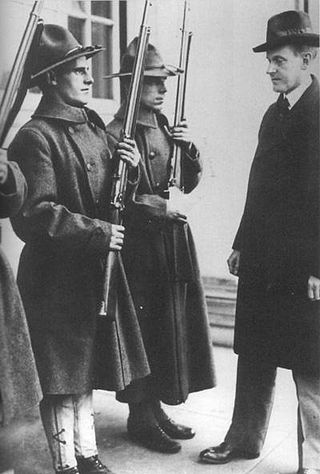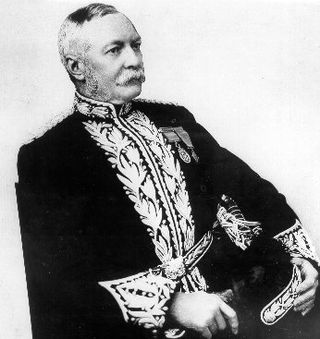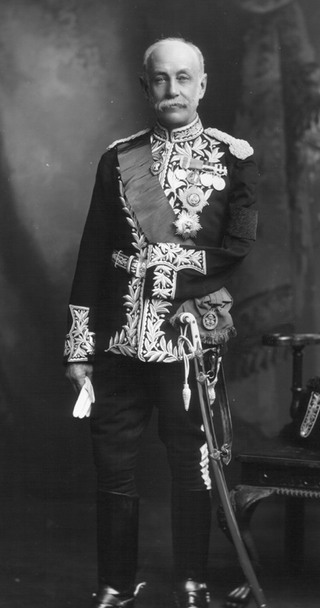
The Metropolitan Police Service (MPS), formerly known as the Metropolitan Police, which is still its common name, serves as the territorial police force responsible for law enforcement and crime prevention within the ceremonial county of Greater London. In addition, it is responsible for specialised tasks throughout the United Kingdom, such as UK counter-terrorism measures, and the protection of certain individuals, including the monarch, royal family, governmental officials, and other designated figures. Commonly referred to as the Met, it is also referred to as Scotland Yard or the Yard, after the location of its original headquarters in Great Scotland Yard, Whitehall in the 19th century. Its present headquarters are near there at New Scotland Yard on the Victoria Embankment.

The Royal Irish Constabulary was the police force in Ireland from 1822 until 1922, when all of the island was part of the United Kingdom. A separate civic police force, the unarmed Dublin Metropolitan Police (DMP), patrolled the capital and parts of County Wicklow, while the cities of Derry and Belfast, originally with their own police forces, later had special divisions within the RIC. For most of its history, the ethnic and religious makeup of the RIC broadly matched that of the Irish population, although Anglo-Irish Protestants were overrepresented among its senior officers.

The Coal strike of 1902 was a strike by the United Mine Workers of America in the anthracite coalfields of eastern Pennsylvania. Miners struck for higher wages, shorter workdays, and the recognition of their union. The strike threatened to shut down the winter fuel supply to major American cities. At that time, residences were typically heated with anthracite or "hard" coal, which produces higher heat value and less smoke than "soft" or bituminous coal.
The 1923 Victorian police strike occurred in Melbourne, Victoria, Australia. In November 1923, on the eve of the Melbourne Spring Racing Carnival, half the police force in Melbourne went on strike over the operation of a supervisory system using labour spies, nicknamed "spooks". Riots and looting followed as crowds poured out of the main Flinders Street railway station on the Friday and Saturday nights and made their way up Elizabeth and Swanston streets, smashing shop windows, looting, and overturning a tram.

The Boston police strike occurred on September 9, 1919, when Boston police officers went on strike seeking recognition for their trade union and improvements in wages and working conditions. Police Commissioner Edwin Upton Curtis denied that police officers had any right to form a union, much less one affiliated with a larger organization like the American Federation of Labor (AFL), which some attribute to concerns that unionized police would not protect the interest of city officials and business leaders. Attempts at reconciliation between the Commissioner and the police officers, particularly on the part of Boston's Mayor Andrew James Peters, failed.

Sir Edward Richard Henry, 1st Baronet, was the Commissioner of Police of the Metropolis from 1903 to 1918. His time in the post saw the first discussions on the introduction of police dogs to the force, but he is best remembered today for his championship of the method of fingerprinting to identify criminals.

James Monro was a lawyer who became the first Assistant Commissioner (Crime) of the London Metropolitan Police and also served as Commissioner of Police of the Metropolis from 1888 to 1890.

Colonel Sir Edward Ridley Colborne Bradford, 1st Baronet, was a British Indian Army officer who later served as Commissioner of Police of the Metropolis, head of the London Metropolitan Police, from 1890 to 1903.

The Baltimore Police Strike was a 1974 labor action conducted by officers of the Baltimore Police Department. Striking officers sought better wages and changes to BPD policy. They also expressed solidarity with Baltimore municipal workers, who were in the midst of an escalating strike action that began on July 1. On July 7, police launched a campaign of intentional misbehavior and silliness; on July 11 they began a formal strike. The department reported an increase in fires and looting, and the understaffed BPD soon received support from Maryland State Police. The action ended on July 15, when union officials negotiated an end to both strikes. The city promised police officers a wage increase in 1975, but refused amnesty for the strikers. Police Commissioner Donald Pomerleau revoked the union's collective bargaining rights, fired its organizers, and pointedly harassed its members.

The 1918–19 British police strikes in the United Kingdom resulted in the British government putting before Parliament its proposals for a Police Act, which established the Police Federation of England and Wales as the representative body for the police. The Act barred police from belonging to a trade union or affiliating with any other trade union body. This Act, drafted and passed into law, was passed in response to the formation of the National Union of Police and Prison Officers (NUPPO). A successful police strike in 1918 and another strike in June 1919 led to the suppression of the union by the government. On 1 August 1919, the Police Act 1919 passed into law. Only token opposition from a minority of Labour Members of Parliament was voiced in Parliament.

Brigadier-General Sir William Thomas Francis Horwood, was a British Army officer who also served as Commissioner of Police of the Metropolis, head of London's Metropolitan Police, from 1920 to 1928.

West Yorkshire Police, formerly the West Yorkshire Metropolitan Police, is the territorial police force responsible for policing the metropolitan county of West Yorkshire, England. It is the fourth largest territorial police force in England and Wales by number of officers.

Anna LoPizzo was an Italian immigrant striker killed during the Lawrence Textile Strike, considered one of the most significant struggles in U.S. labor history.

The Memphis sanitation strike began on February 12, 1968, in response to the deaths of sanitation workers Echol Cole and Robert Walker. The deaths served as a breaking point for more than 1,300 African American men from the Memphis Department of Public Works as they demanded higher wages, time and a half overtime, dues check-off, safety measures, and pay for the rainy days when they were told to go home.

The General Strike of 1910 was a labor strike by trolley workers of the Philadelphia Rapid Transit Company that grew to a citywide riot and general strike in Philadelphia, Pennsylvania.

The New York City Police Riot of 1857, known at the time as the Great Police Riot, was a conflict which occurred in front of New York City Hall between the recently-dissolved New York Municipal Police and the newly-formed Metropolitan Police on June 16, 1857. Arising over New York City Mayor Fernando Wood's appointment of Charles Devlin over Daniel Conover for the position of city street commissioner, amid rumors that Devlin purchased the office for $50,000 from Wood, Municipal police battled Metropolitan officers attempting to arrest Mayor Wood.

The Ministry of Defence Police (MDP) is a civilian special police force which is part of the United Kingdom's Ministry of Defence. The MDP's primary responsibilities are to provide armed security and counter terrorism services to designated high-risk areas, as well as uniformed policing and limited investigative services to Ministry of Defence property, personnel, and installations throughout the United Kingdom. The MDP are not military police. Service personnel often refer to the MDP by the nickname "MOD plod".

John Henry Hayes was a British police officer, trade unionist and politician. After serving in the Metropolitan Police, he became general secretary of the National Union of Police and Prison Officers. In 1923, he became the first Labour Member of Parliament in Liverpool when he was elected to represent Edge Hill. From 1929 to 1931, he served in government as Vice-Chamberlain of the Household.
The Empire Zinc strike, also known as the Salt of the Earth strike, was a 15-month-long miners' strike in Grant County, New Mexico against the Empire Zinc Company for its discriminatory pay. The strike drew national attention, and after it was settled in 1952, a movie entitled Salt of the Earth (1954) was released that offered a fictionalized version of events.
The 1872 Metropolitan Police strike was a refusal to work by 180 men of 'D' (Marylebone), 'E' (Holborn) and 'T' (Kensington) Divisions of the Metropolitan Police of London on 16 November. The strike was held in protest at the dismissal of PC Henry or Harry Goodchild (1840-1899), who had acted as a secretary coordinating meetings amongst police who were demanding improvements over pay and conditions. It is considered the first strike by police in the United Kingdom.
















